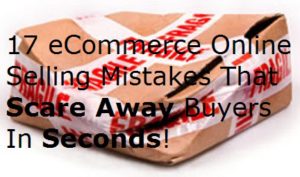17 eCommerce Online Selling Mistakes That Scare Away Buyers In Seconds!
by Admin Joe
Published – Oct 27th 2017
Updated – Dec 3rd 2017
I’ve messed up through trial and error many times in my online selling journey. These can be mistakes such as sending to the wrong address to getting your expenses wrong. I have messed up before on both accounts so you are not alone.
This may well beg the question, who am I to lecture you about anything in regards to eCommerce? Well let me elaborate on that.
I have my dropped my fair share of clangers, however a lot of these setbacks have helped me along the way. This is because I have learned from them first hand.
I wanted to make this list so that I can make these online selling errors known to you. This is in the hope that you can avoid them before you could possibly have the opportunity to make them. I’m a nice guy like that.
“Your most unhappy customers are your greatest source of learning.” Bill Gates (Microsoft Founder)

You said it best Mr. Gates, you god damn (unusually young-looking) genius! Also, please stop looking at me so seductively, I’m not a piece of meat.
Even when you’re failing, you are still making progress. Constant failure eventually teaches you what not to do (as silly as it sounds).
Think about this if you’re struggling with your online selling business. Analyse what you’re doing wrong and really think about what you can do to fix the problem.
Making lots of mistakes consistently in eCommerce can result in buyers actively avoiding shopping with you. They will see that you are unreliable and not to be trusted. That will then have a chain reaction if or when they reveal your f*ck-ups to their friends and family.
Here’s an interesting statistic. Almost 90% of buyers will completely stop purchasing from you if they ever receive poor service. This is why I strongly suggest that you read my list thoroughly. You can then ultimately prevent this from ever happening.
Making any kind of online selling mistake in the world of eCommerce, eBay or anywhere else can really stick a dagger in your business for a lengthy period.
It can reduce sales exponentially and force buyers to flee for the hills like the elusive Bigfoot with no hope of return. This is because there are plenty of other options (sellers) that can get the things right that you’re getting terribly wrong.
Here are some of the most common eCommerce mistakes that you should be aware to steer clear of.

1. Falling for eCommerce Scams
There are an array of online selling scams that certain unscrupulous buyers (or scumbags as I like to call them) like to try out on newbie sellers.
I’ve never personally been caught up in any scams (can’t stump this fella). However, you don’t have to be utterly naive to be a victim of some of these online scams. Scam artists come up with crafty and unique ways of tricking people all the time. Even the smartest person in the room is at high risk.
If you want to learn much more about dodging scams then check out the How To Spot And Survive Scams On The Internet eBook. Tools like this will help you spot suspicious schemes more easily.
One example involves accepting over the amount of money required as payment. Afterwards, the scammer will claim that you owe them a vast sum of money (more than you actually owe them).
You can get into deep trouble if you get dragged into this trap. This scheme is commonly referred to as the banker’s draft scam. It’s good to be extra cautious is the main point to take away from this.

2. OVERUSING CAPS LOCK (like I just did)
Typing your eCommerce listing headline all in capital letters doesn’t really grab anyone’s attention. It will unlikely have the desired effect. I’ve seen plenty of sellers do this before and my head falls into my hands every time.
Many observers will just find it tacky and desperate. Buyers can find titles that are all in caps lock to be quite annoying. Try to avoid it and make your listing enticing in other ways.
3. Irrelevant Words
Your title needs to be to the point and contain words that online buyers are likely to search for.
Using words like “amazing” is kind of pointless in my opinion because surely that is for the buyer to decide, not you. Instead, you should use useful words like “waterproof” if you’re selling hiking boots or something like that.
An eCommerce customer might search for “Lightweight Acer 12 inch HD Laptop” and not “Awesome & Funky Laptop” *face-palm*.
You can master keyword research with products like Clever Gizmos. This should help you find the best, low competition keywords that will attract lots of traffic and more importantly buyers.
4. PLAGIARIZING other eCommerce Listings
Copyright is a big talking point for any sort of online content. You should never copy or steal someone else’s online selling title, description or pictures and use them as your own.
Your reputation doesn’t want to be of a guy that steals other people’s hard work. It might seem like a quick shortcut to success but you’d be dead wrong about that. The relevant authorities will catch up with you in the end so it won’t pay off in the long-term.
There are programs out there such as Plagiarism Checker. This allows you to check if your content is the same as somebody else’s and vice versa. If you can do this then your content should rank much higher. This software has lots of positive testimonials so I would say it’s worth serious consideration.
It’s okay to take inspiration from something but you should never copy it word-for-word. There needs to be a big enough distinction for it to be seen as your own original creation.
If you get caught then you will get in trouble with the selling platform, the person you stole from and quite possibly the law.

5. Backtracking on Online Selling Promises
When you first list something, you will state the terms of the deal for the buyer to see. You need to honor these rules you have imposed within the eCommerce description after the purchase has been made.
The worst case of this could be something like asking for more money than the original asking price (don’t be that guy).
You can’t just suddenly change tack because it’s inconvenient for you as this is unfair on the buyer’s expectations.
[bctt tweet=”Buyers don’t like unresponsive sellers, especially after the sale. You should resolve issues quickly and fairly.” via=”no”]
6. Charging Extra Unexpected Fees
If you bought something online for a clearly defined price then you would expect to pay exactly that. You don’t want to find out about additional eCommerce costs being sprang on you. This especially unsettling if you weren’t previously aware of it. This could be an added on fee for shipping and the like.
You need to be very clear about the full, complete price and not omit any additional charges beforehand.

7. Unnecessary Punctuation
You don’t need to use punctuation in your item titles. You may as well omit any full stops or commas as this will save on your already limited amount of available characters. On these occasions, saving letters takes priority over perfect grammar.
8. Lying about Item Condition
Don’t try your luck by passing off a refurbished eCommerce item as “brand new”. This will hurt the buyer and also your online selling business even more so. You shouldn’t try to upgrade “good” condition to “excellent” condition either if you know deep down that it isn’t true.
It’s really important to be honest with your customers. Describe the condition of the item accurately and mention any other flaws. It’s better to be modest and undersell it rather than build it up to something that it isn’t.
In other words don’t dress up Redneck Randy’s rusty old pick up truck to look like a fresh-out-of-the-factory Lamborghini. If you do this then expect an avalanche of buyers requesting refunds or returns.
9. Rising to Confrontation with customers
If an online customer is ever rude to you then it can be tempting at times to be rude back. I’ve found myself in this situation a few times before. If you do negatively engaged them then it will only escalate the problem.
I’ve had a very small minority of buyers in the past throw wild accusations at me that were completely false. These bad buyers didn’t have a shred of proof to back up these claims I might add.
Rather than become aggressive back, I would just politely tell them that they are incorrect (if in fact they are). Remember, if you conduct yourself with complete honesty and integrity then you have absolutely nothing to worry about.
Avoid retaliation at all costs and take the high ground whenever you can. It will only damage your eCommerce business reputation if you decide to lash out. Exercise some self-control and kill them with kindness, that’s what I say!

10. Passive-Aggressive Language
Try not to use a threatening or nagging tone while typing details into your online selling listing. This can cause buyers to have a bad impression of you. People obviously don’t like buying from sellers who talk down to them and treat them disrespectfully.
You shouldn’t type “DO NOT BID ON THIS IF YOU’RE NOT GOING TO PAY FOR IT!”. I can understand the frustration of having to write something along those lines. In contrast, you should really go about it in a more polite and friendly manner.
If you’ve ever had any experience of running an eBay auction then you will know exactly what that was all about. Eat rocks non-paying bidders *shakes fist*
11. Selling Banned Products
Check the rules of whichever eCommerce platform you are selling on. There may be certain products that you aren’t allowed to sell like perishable items such as food. I believe that you need a food hygiene license to sell anything edible.
You also need to check out the laws of other countries as some products can’t be sold in certain territories.
12. Writing Inaccurate eCommerce Listings
The product needs to be an accurate reflection of what the listing describes it as. Be honest and accurate when writing about your product.
If you lie, mislead or exaggerate too much in any way shape or form then the eCommerce customer won’t be happy. Conversely, they will then most likely will want a return or refund.
[bctt tweet=”Buyers can find titles all in caps lock to be annoying so try to avoid it and attract customers in other ways.” via=”no”]
13. Manipulating Shipping Price
Always try to be upfront about both the product price and the postage/packaging price with your customers. Online buyers have become more savvy and will want to know the full, complete price. They want clarity about whatever it is that they’re buying.
I wouldn’t recommend increasing the shipping fee. This is to make the cost of the eCommerce product appear lower because this would be dishonest.

14. Poor Spelling, Grammar & Punctuation
Remember how your English teacher used to hammer into you how important correct spelling is? Well, it turns out there is a real-world use for it. I hope you were paying attention in class.
For a professional first impression, double-check the spelling and grammar of your listing title to make sure that it is right. Proofread and spellcheck your listing thoroughly before posting. Sloppy spelling will make you look incompetent and lazy which I’m sure you’re not.
If you need additional help or just want to save time then you could always try Proofread Bot. This is an automated tool that will accurately check the spelling, punctuation and grammar of your content.
15. Responding Slowly to customer Queries
Ensure that you promptly reply to any eCommerce customers that want to talk to you about the product. Buyers do not like unresponsive sellers, especially after the sale has happened. You should resolve customer issues quickly and fairly wherever possible.
Some queries may be dependent on time. This means if you are tardy then the issue may not matter anymore by the time you’ve got around to responding. It could be something like asking a question about an auction that is close to ending. Keep an eye on your inbox.
16. Ignoring ‘The Sales of Goods Act 1979’
This one is mainly for you UK readers out there. Wait a minute, sit your ass back down rest-of-the-world because you may benefit from this too.
Don’t forget to keep in mind ‘The Sales of Goods Act’ throughout your online trading activity. This piece of legislation ensures that the seller delivers a product that is at a satisfactory standard of quality, fit for purpose and exactly as described.
Covering these three bases ensures that the buyer is being treated fairly. This is ultimately what you want wherever you are in the world as well as making money of course.
As I’ve alluded to, ‘The Sales of Goods Act’ is a British law. On the other hand, I’m sure there are similar selling rules in your country of residence in order to keep selling standards high.
17. Growing Impatient
Nothing that takes time and hard work will ever come easily or quickly. Don’t become disheartened if you don’t see eCommerce sales right away after your online listing goes live. It takes some waiting and things won’t improve if you’re sat there watching it like a hawk.
For me, it took time to build up steam before I saw any results. Once you start learning the ropes it should be pretty straightforward.
It helps to increase your chances by listing lots of products with the hope of at least catching a sale with one of them. Sales will become easier as you become more established and experienced.
True success is all in the mind for the most part and has a lot to do with having a positive attitude. You can get help with Mav Coaching and from there you can learn about self-discipline. In addition, you will be taught all the other elements that go into becoming a business bad boy (or girl). There are lots of positive reviews to back this tool up as well.

If you can avoid most of these eCommerce errors then I’d say you would be well on your way to becoming a great online seller.
We have learned that if you plan your business out, you can evade inadvertently breaking selling laws. On top of that you won’t be violating guidelines of big sites such as eBay, Amazon, eBid Holding USA Inc etc.
The next thing I would recommend that you do is brainstorm any mistakes that you might have made in the past. You can them take a note of them in a list similar to this one and combine them with some of my own points above.
You will then be able to have this for reference in the future. This means you can look at it before you stumble into a problem of your own making.
Now that you know the no-no’s, why not check out my 47 eCommerce Online Selling Tips To Catch & Keep Buyers For Life! list so you know what you should be doing.
Have you ever made any big mistakes when selling online that you’ve paid a big price for? What’s the worst way you messed up while selling? Please don’t forget to share this with your friends and comment below. Thanks for reading!
Related Posts:
53 Epic eBay Selling Tips To Skyrocket Your Profits & Reputation
17 eBay Selling Errors That Make You Invisible To Buyers
26 Postage & Packaging Tricks That Your Buyers Will Love
Shocking Secrets Of Sourcing Cheap Wholesale Inventory & Suppliers
Why Won’t My Buyers Give Me Positive Feedback & Reviews?
The Most Useful eBay Upgrades With Fees + eBay Store Guide
How Top Sellers Handle eCommerce Payments, Returns & Refunds
